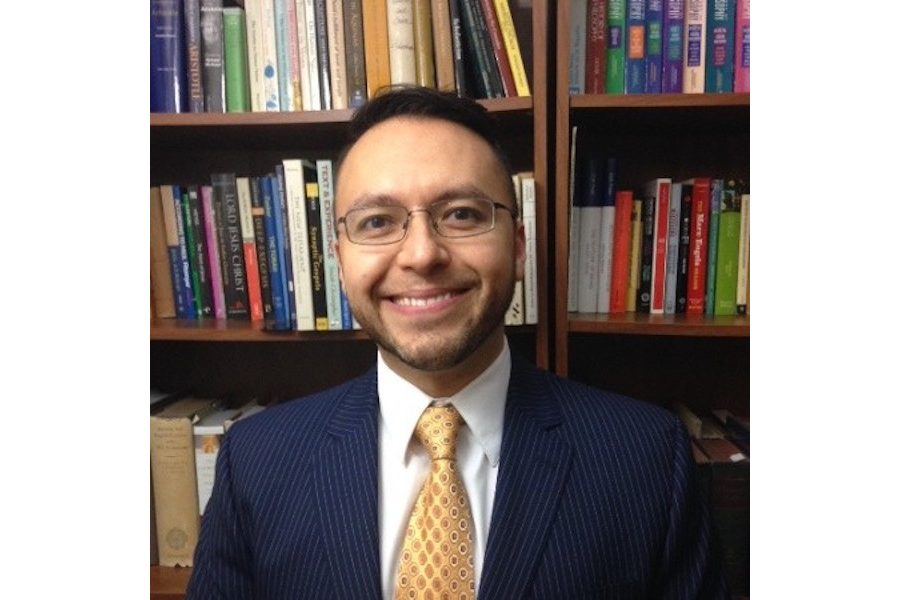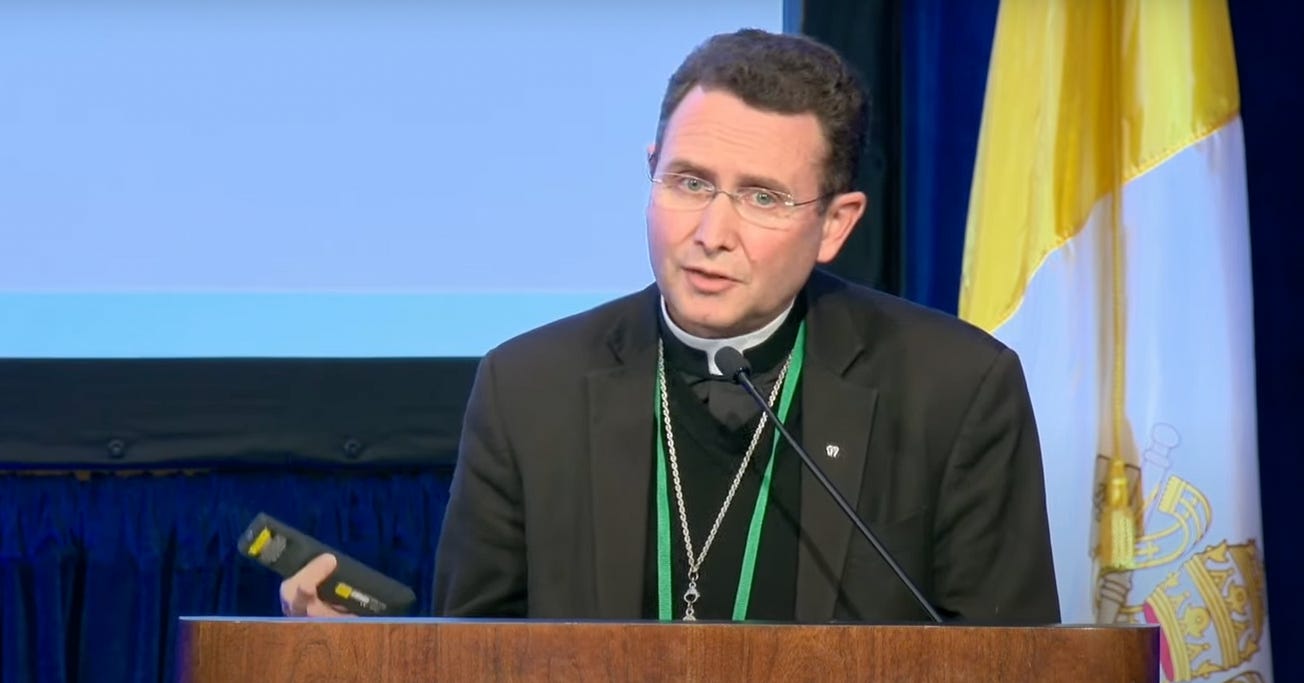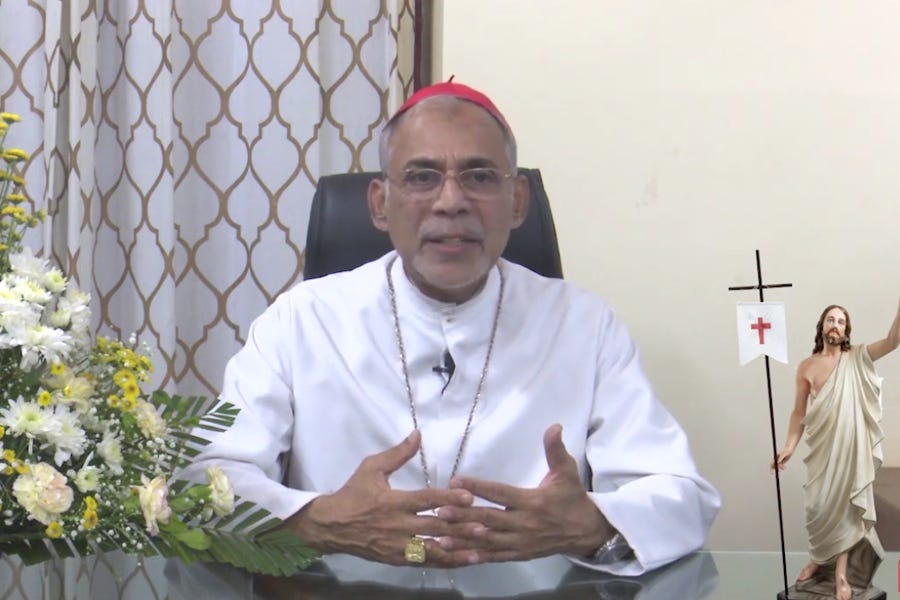
Last month, a group of clergy and laity gathered in Baltimore for the inaugural meeting of the Institute on the Catechism.
The idea behind the new institute was laid out by Bishop Frank Caggiano of Bridgeport, head of the Subcommittee on the Catechism, at the fall USCCB meeting last year.
The institute is intended to be a proactive response to changes in the catechetical landscape, such as a rise in the religiously disaffiliated, the growing percentage of Hispanic Catholics, and the increased use of technology in catechesis, Caggiano said.
It is not designed to be a physical place, but a bicultural effort to develop teaching and evangelization materials, hold annual formational conferences, and promote evangelizing catechesis.
The institute will collaborate with the USCCB and expert institutions, including the Denver-based Augustine Institute and the McGrath Institute For Church Life at the University of Notre Dame.
Charles Camosy spoke this week with Carlos Taja, the associate director of the USCCB’s Secretariat of Evangelization and Catechesis, and the founding director of the Institute on the Catechism.
The USCCB's Subcommittee on the Catechism oversees the Institute on the Catechism.
Last month, Bishop Frank Caggiano, chair of the subcommittee, presented to bishops an update on the institute, in which he said the vision and structure of the Institute is grounded in the Church's "Directory for Catechesis."
Can you expand on how the directory's vision is expressed in the institute's vision and structure?
The "Directory for Catechesis" is the blueprint and vision the institute aims to implement on behalf of the U.S. bishops.
The vision can be synthesized in the term ‘evangelizing catechesis,’ which aims to place the encounter with Christ first and foremost as the foundation of all catechetical formation, teach catechists how to proclaim the kerygma of salvation, initiate a systematic formation in the faith, accompany catechists and teach them how to accompany those they minister to in and outside of the classroom, and connect all of the ministry of catechesis as an ecclesial act entrusted to the entire Church and delegated by the local bishop and his collaborators.
"Evangelizing Catechesis" was the overall theme for the inaugural launch of the institute. Key paragraphs for understanding the structure of the Institute are: 154-156 (regarding centers for formation), 411 (regarding the Eastern Catholic Churches) and 412-425 (regarding the episcopal conference and dioceses).
The directory distinguishes between diocesan centers of formation (cf. 154), a national center of formation for diocesan and national catechetical leaders (cf. 155), and centers for higher education, such as universities and their institutes of formation (cf. 156).
The Institute on the Catechism identifies with #155 in the directory, since its aim is not to replace or duplicate the work of diocesan centers of formation, nor to compete with or replace universities and their institutes.
The Institute on the Catechism aims to serve the local bishop, collaborate in the formation of catechetical leaders, collaborate with institutions of higher learning, and to accompany those Catholic publishing houses to effectively create materials for catechetical programs through the lens of evangelizing catechesis and founded on the teachings of the "Catechism of the Catholic Church."
The Institute on the Catechism was launched with three cohorts: bishops, diocesan staff, and Catholic publishers. What happens after the inaugural launch of the institute with these three groups? And what can we expect for next year?
Prior to launching the Institute on the Catechism in November 2022, the cohorts of stakeholders the institute aims to accompany and serve met with Bishop Caggiano, and with a team that accompanied the conversation various times throughout 2022.
At this year’s institute launch, most of these cohorts met in person for the first time.
The cohorts can be divided into three groups: bishops who have Catholic publishing houses within their diocesan territory or bishops who serve on collaborating USCCB committees, diocesan staff from among the bishops invited to attend the launch, and Catholic publishing houses throughout the country that publish catechetical materials for grades K-12.
The goal of 2023 is to expand the conversation with the three cohorts beyond the inaugural launch, whose theme was “Speaking the Truth in Love” (Eph. 4:15).
Throughout 2023, the three cohorts that were invited to attend the Institute (regardless of whether they attended or not) will have various opportunities to meet via Zoom. Based on these conversations, next steps for implementing the directory, the bishops’ guidance on the implementation process of the institute, and the priorities that are identified throughout the accompaniment process will inform the 2023 Institute in-person meeting.
Funding will also determine how much we can develop permanent platforms of communication among these cohorts and the institute. Donations would be most welcome.
There have been lots of discussions, over decades, about the apparent failure of the U.S. Church to catechize after the Second Vatican Council.
How much of the problem we've had in handing on the faith, in your view, has come from a failure to catechize vs. a failure in other respects?
In my opinion, by far, the worst problem in catechesis is that catechesis has lost its clear goal and purpose for those in the ministry of catechesis. How can any catechist effectively witness Christ to their students if they are not supported in fomenting that relationship themselves?
If the goal of catechesis is not based on the encounter with Christ, then what do we think happens when we celebrate a sacrament? Isn’t sacramental initiation about being initiated in the life of God? Many children are not ready to be initiated in the reception of the sacraments, either because they do not have faith or do not understand he whom they receive. It is wrong to either force or be indifferent to the unworthy reception of the sacraments by adults or children, just because they completed the required time in the sacramental preparatory program.
Instead, we should follow the inspiration of the catechumenal model which includes the scrutinies, accompaniment, mystagogy, and gradual initiation. The Catechumenate is recommended in the "Directory for Catechesis" 61-65, as a source for inspiring catechesis. Should we not systematically accompany people into the life of faith and ask them regularly what their challenges or questions are throughout the entire process, rather than focus on completing a program or lessons without asking the essential question: “do you believe”?
The formation of catechists is key, as is the personal and consistent involvement of the parents and the clergy. Forming parents to fulfill their God-given role to hand down the faith to their children, as well as to help catechists interact frequently with parents in the catechetical ministry is, in my opinion, the most effective and most absent element of contemporary catechesis.
Parents cannot be replaced by catechists or teachers in or out of the classroom. Catechists and catechetical materials can only assist the formation of a child’s faith, but its growth and nourishment happen at home, and when parents do not practice the faith, then it happens when children interact with their grandparents or whoever is taking them to catechesis and is interested in nourishing their life of faith.
The Church is the family of families, but that does not mean it should attempt to replace the role of parents nor should it focus catechist formation on information to be handed on to children, rather, catechists should be systematically formed and supported by their pastors to engage parents frequently and effectively as an instantiation of evangelizing catechesis.
In Evangelii nuntiandi, 14, Pope St. Paul VI teaches that “Evangelizing is in fact the grace and vocation proper to the Church, her deepest identity. She exists in order to evangelize, that is to say, in order to preach and teach, to be the channel of the gift of grace, to reconcile sinners with God, and to perpetuate Christ's sacrifice in the Mass, which is the memorial of His death and glorious resurrection.”
This is why the answer of Pope St. John Paul II, reflecting the sessions of the Synod of Bishops on cvangelization (1974) and catechesis (1978), and the conclusion of the Synod of Bishops in 1985 was that a catechism or compendium of the faith should be written. Therefore, the "Catechism of the Catholic Church" was written, whose aim was to serve as a sure norm of Catholic teaching.
However, the catechism is not meant to replace the role of evangelization, but to serve it as “the” tool for effective evangelization, in other words, a tool for an evangelizing catechesis that addresses the issues of our time while also faithfully and completely handing down the faith in a comprehensive, intelligent, and faithful manner.
From Pope St. Paul VI through the pontificate of Pope Francis, there has been an overwhelming echo of Vatican II’s call to integrate catechesis within the framework of evangelization as part of the missionary vocation and zeal of the Church. This integration between evangelization and catechesis is found throughout the "Directory for Catechesis," 40, which cites Pope Francis’ Evangelii gaudium, 20-33 calling for a new “pastoral conversion” that renews all Church structures and puts all the baptized in a “permanent state of mission”.
How do you think the institute can help catechesis in relation to evangelization?
Models of catechesis need to be discussed among bishops, diocesan leaders, and Catholic publishing houses to develop a common vision and end goal. The Institute can be the place where the content creators and the content users dialogue to develop the best resources with the clearest vision for effective implementation.
Most importantly, it can serve to train a new generation of catechists by collaborating with institutes of higher learning that are already effective in this task, such as the Franciscan University of Steubenville and the Augustine Institute, whom the institute has already partnered with.
Let's get practical: How do you think the institute could help dioceses around the country?
The institute can serve as a nexus of communication that surveys the national problems [and] gathers best practices that are working in different diocesan regions, organizations, and institutions [that] may not be in contact with each other.
Most importantly, it can serve as the place where the diocesan leaders of parish catechists receive support and formation under the lens of an evangelizing catechesis. Through these leaders an entire diocese can hand down formation and best practices.
The institute can accompany bishops and their diocesan staff to support their implementation of robust catechist formation that is centered on the encounter with Christ, accompaniment of our people, proclaiming the kerygma, and identifying elements of a systematic catechetical formation.




